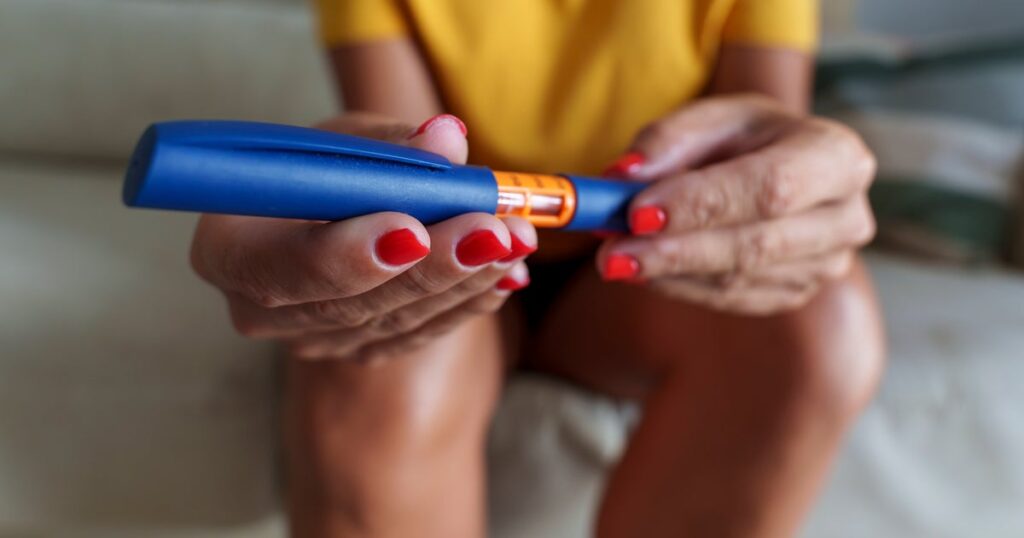You’re probably all too familiar with Ozempic and other diabetes medications that are commonly used as weight-loss drugs. Diet culture is in the spotlight again, and public figures like Elon Musk and Oprah Winfrey have shared that they’ve taken the medication (or a similar one).
Here’s the more interesting news: According to recent research, Ozempic may not only address diabetes symptoms or lead to short-term weight loss — it could also potentially help people recovering from addiction.
Essentially, Ozempic and Wegovy are brand names for semaglutide, which is in the GLP-1 receptor agonist (GLP-1RA) drug class. It can make rewarding substances less, well, rewarding, by altering the release of dopamine (the “pleasure” neurotransmitter).
For example, “Botched” doctor Terry Dubrow said Ozempic took away his appetite and the joy of eating (though, side note, we have to stop blaming a “lack of willpower” for eating wrongfully demonized foods). And many others have reported a similar experience.
Many are theorizing that semaglutide could have the same effect on addictive substances and behaviors: People may be less likely to turn to their substance(s) of choice, whether that’s alcohol, nicotine, opioids, cocaine or something else.
“What we’ve found is the medications can reduce [substance] cravings and ‘turn down the noise,’ allowing our patients to better engage in treatment and build their recovery toolbox, while dealing with underlying issues and comorbid conditions,” said Dr. Mohammad Sarhan, an addiction medicine physician at Caron Treatment Centers.
Ahead, he and other doctors and addiction experts share more of the possibilities and limitations of using semaglutide as treatment for substance use disorder.
The evidence is a good start, but not enough.
But so far, few studies on the topic are available, and they’re preliminary. Simply put, more research is needed to come to a solid conclusion.
“While the results are encouraging, it’s really important to understand that we don’t have a definitive answer yet,” said Dr. Earin Chaudry, the chief medical officer at Voy, a weight loss program that provides medication and coaching.
He also pointed out various specifics that are unknown at this point. Will women’s bodies react differently from men’s? What’s the right dosage for this condition? Those are only a couple of the questions that need answers.
Dr. Sadia Saeed, a physician and senior house officer at Welzo, agreed the results are promising but that it’s too early to say more than that. Welzo is a U.K.-based platform that connects you to health products, services and supplements.
“To say that it’s a smart choice is premature,” she said. “Additional trials are needed to demonstrate efficacy, safety and dosing for alcohol use disorder. Currently, off-label use exists for addiction.”
Other medications can help with substance addiction and have been used longer.
Believe it or not, Ozempic is not the first medication used to reduce cravings and pleasure from substances.
“There are already medications that are proven and approved for this, like naltrexone or acamprosate, which doctors usually recommend first,” said Dr. Zaid Fadul, the CEO at Bespoke Concierge MD and medical director at Better U, an alternative mental wellness organization dedicated to increasing access and awareness to innovative treatments. “I have started incorporating it at a low dose for my patients as part of a comprehensive plan to limit and eventually eliminate alcohol use.”
“Addiction is a complex brain disease that requires a multi-disciplinary approach and long-term support to achieve long-term recovery.”
– Dr. Mohammad Sarhan, addiction medicine physician at Caron Treatment Centers
Naltrexone and acamprosate are FDA-approved medications that help people maintain sobriety from alcohol, opioids and other substances.
Dr. Safina Adatia, a dual board-certified physician in addiction and family medicine who specializes in treating substance use disorder in urban communities and rural Indigenous populations, gave a similar response. “I generally consider it a second-line option behind more evidence-based therapists, such as naltrexone and acamprosate,” she said.
Ozempic shouldn’t be used by itself for substance treatment.
Sarhan has seen GLP-1R antagonists reduce cravings in clients with substance use disorders, but they’re only one ingredient, so to speak.
“We recommend strongly that these medications are not used as a standalone treatment as they are not approved for this use,” he said. “Addiction is a complex brain disease that requires a multi-disciplinary approach and long-term support to achieve long-term recovery.”
Even naltrexone and acamprosate can’t treat addiction all on their own.
Other treatment options include individual counseling, family counseling, support groups, harm reduction strategies and more.
GLP-1 medications have drawbacks.
While it’s exciting that a new type of treatment for addiction might be on the horizon, we can’t forget that this possible “solution” is imperfect.
“Like all medications, there can be potential side effects, such as nausea, muscle loss or changes in mood,” Chaudry said. “These need to be carefully thought about and discussed with a doctor.”
Some of the other most common side effects include bloating, constipation, diarrhea, heartburn, stomach discomfort and vomiting.
Patients who take Ozempic for addiction will also face some of the same barriers that others do, Sarhan said: the high cost (plus the fact that its current lack of FDA approval means most insurance companies won’t cover it), a return of cravings when the medication is stopped, and so forth.
With that said, experiencing and treating substance use can unfortunately be expensive, regardless.
“If we are trying to reduce spending in health care, I would be interested to see a cost analysis of a GLP-1 prescription as a preventative measure against the cost of frequent visits to the emergency department (ED), which happens to many of my patients,” Adatia said. “We can potentially lower the risk of ED visits for severe withdrawal or overdoses by proactively treating substance use disorders.”
Ozempic’s potential to cause weight loss can be a problem.
A friendly reminder that weight loss doesn’t always make you healthier: “I often treat [substance addiction] patients who are experiencing homelessness and suffer from food insecurity, so many of them are underweight, and a GLP-1 medication would not be appropriate,” Adatia said.
Addiction is particularly present in unhoused and marginalized communities, potentially and partially due to the discrimination they face. For example, about one-third of unhoused individuals struggle with alcohol and/or drugs.
Additionally, we have to consider people who have a low weight due to other health conditions, such as anorexia nervosa. About 27% of individuals with anorexia also abuse substances, and 32% of women who call cocaine abuse hotlines have a diagnosable eating disorder.
Weight-loss drugs can also become addictions on their own and cause people to lose too much weight, as warned by Ozempic user and celebrity Sharon Osbourne.
It can’t completely eradicate someone’s substance use.
Looking at recent research, Sarhan added that semaglutide alone can’t lead to full sobriety, which is a goal for many people in recovery.
“[Weight-loss drugs] did, however, decrease the number of drinks consumed per day,” he said. “This underscores the importance of engaging in a treatment plan that doesn’t just suppress use, but also supports the other physical, medical, spiritual and psychological needs of an individual struggling with alcohol.”
Alcohol and Ozempic do not mix well, either, as the combination can increase the risk of hypoglycemia, or dangerously low blood sugar. So even a little drinking on the medication could cause problems.
The Bottom Line
If you’re considering taking semaglutide for addiction, Fadul urges the following:
- Talk to your health care provider first.
- Use it only as a part of a treatment plan — also incorporate regular therapy and/or support groups.
- Watch for side effects and let your health care provider know if you have any concerns.
- Stay informed and up-to-date on new research.
- Know it isn’t guaranteed to work for every person in every situation.
- Consider sticking with treatment options that are already known to work.
At the same time, know that semaglutide may not be your best bet for treating substance use, at least right now.
“While the idea that medications like Ozempic could help with alcohol addiction is exciting and supported by early research in animals and some observations in humans, it’s not yet an approved or standard treatment,” Chaudry said.
Sarhan agreed, particularly regarding the complexities of addiction. “Addiction is a life-long, chronic brain disease that needs to be managed as such.”
Need help with substance use disorder or mental health issues? In the U.S., call 800-662-HELP (4357) for the SAMHSA National Helpline.
Read the full article here








